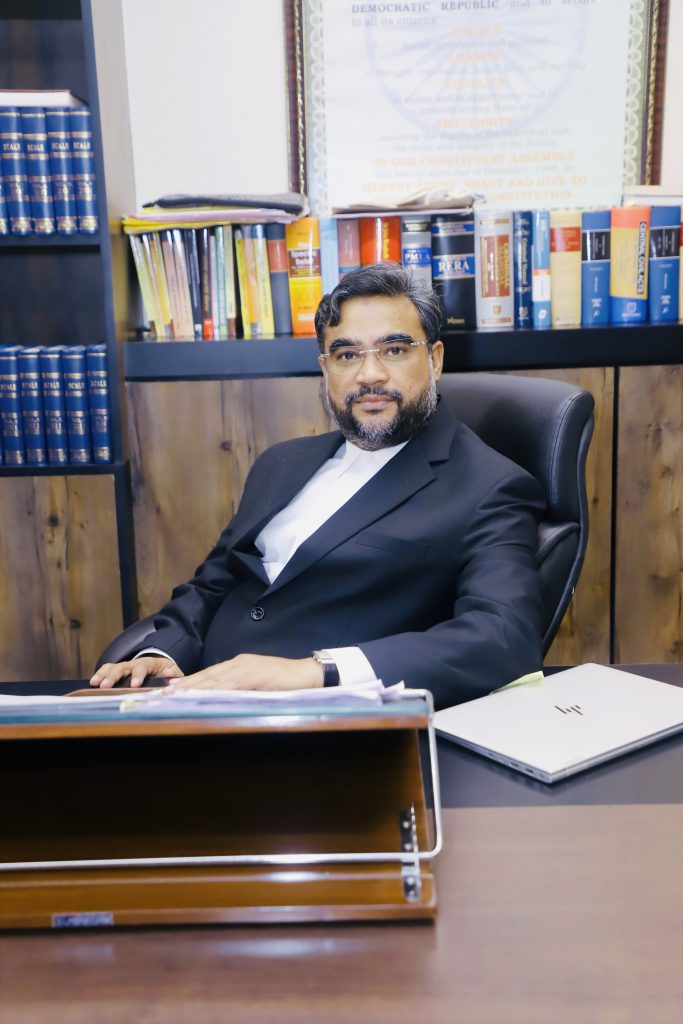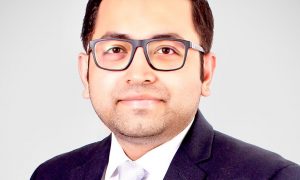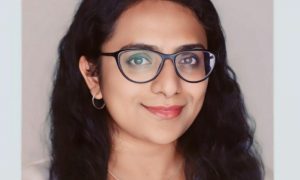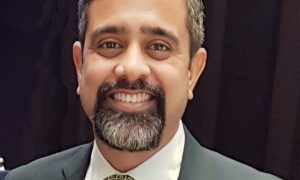This interview has been published by Priyanka Karwa and The SuperLawyer Team

Can you share with us your journey into the field of law, from your early education at Aligarh Muslim University to obtaining a Ph.D. in Law from Sai Nath University? What motivated you to pursue such a diverse range of legal experiences?
It was never in my plan to become a lawyer. After completing my High School in the year of 1999, I had the option to choose between the streams in either Science or Commerce, however, I opted for Commerce stream and completed my higher secondary. Thereafter, I was all set to opt for B.Com. and was even selected for the said course, however, upon the insistence of one of my friends, I sat into Entrance for B.A.(LLB) and was fortunately selected. The interesting part is that my friend, who had also appeared for said B.A.(LLB) Entrance, was not able to make it to the final list and was put on the waiting list. He was also on the waiting list in B.Com. Thus, it was resolved amongst us that in whichever course, his waiting list is cleared, I will go for the said course.
A very interesting aspect is that although we both did our law from the faculty of law at AMU, yet, while I joined the profession, he opted to do M.B.A. in Singapore and is now working with a Singapore based Company in the management sector. I topped the first and second semester of B.A.(LLB), however, while I was in third semester, I was framed and suspended by the Proctorial Department of University in a case related to student protest. This particular unfortunate development, which has led to a paradigm shift in my thinking, I, simultaneously, deviated from my academics and turned out to be a full time student activist. At that time, the student union at AMU was defunct so I led agitation for its restoration. The agitation was successful and the student union was restored.
It is important to note here that to the best of my knowledge, the student union of AMU is the only student union in India, which has its existence in statute i.e. AMU Act, 1920. I am telling all these for a simple reason that my period as student activist and later on, I, being elected as honorary secretary of AMU Students Union by record margin till date, actually honed my skills of public speaking, which is now paying dividends and helps me a lot in my legal profession as an advocate. I completed my B.A.LLB in the year of 2007 and joined the profession. My LL.M. and Ph.D. were completed whilst I was also practicing. Fortunately, in those days, that was allowed. Therefore, my advent into the legal profession was purely accidental, it was never planned, however, as destiny would have it, I became a lawyer.
As the Managing Partner of Diwan Advocates, you’ve been involved in various aspects of law, including corporate, commercial, intellectual property, and civil matters. Could you highlight a specific case or project that stands out as particularly challenging or rewarding in your career?
As an advocate for the last 16 years, I have been fortunate by the grace of Almighty to handle a diversified range of litigation, right from hardcore civil, criminal, corporate & commercial to intellectual property rights and so on and so forth. For a lawyer, every case which he/she handles is very special. However, since you have asked about a particular case, which has been challenging or rewarding, therefore, I would recall a case, where I was appointed by Hon’ble Delhi High Court as Amicus Curiae during the peak of Covid-19 pandemic. The said case was widely reported in the media. It was a case of a widow of the deceased, who was from Himachal Pradesh and while working in Saudi Arabia, he died. Despite the deceased being Hindu, due to certain mistakes on the part of the Indian Embassy and the officials based there in Saudi Arabia, he was buried as per Muslim rituals and customs. The widow, therefore, had approached Hon’ble Delhi High Court by filing a writ petition seeking direction to the Union of India for ensuring repatriation of mortal remains of the deceased.
It was a very challenging case, since the directions only to the concerned officials of the Union of India would not have yielded any result since the mortal remains were to be repatriated from a foreign country and such case was unknown to that country as it did not have any prior history of such exhumation of mortal remains. Despite all these challenges, Hon’ble High Court took up the matter and during the course of the proceedings, I was appointed as an Amicus Curiae in the said matter. It was a time of enormous difficulty as Covid-19 pandemic was at its peak and the movement was restricted. Upon being appointed as an Amicus Curiae, which was then for the first time in my entire career, I was a bit nervous since I did not know what had to be done. However, I started collating all case documents and used my AMU related network to find out persons who are based out in Saudi Arabia so that they could render some assistance.
Saudi Arabia, at that point of time, was also engulfed and confronted with Covid-19 pandemic and the mobility was also limited. However, one of my old friends, after understanding the matter, assured me of his help and he travelled from a far distant city of Saudi Arabia to the concerned hospital where the corpus was kept before its burial for tracking of relevant records. It was learnt by my friend, who later informed me that Saudi Arabia maintains the geo-tagging records of all the graves. Fortunately, with the help of technology, it was revealed that the deceased was buried in which particular grave.
After the above mentioned turn of events and initial breakthrough, the challenge was how to assist the Hon’ble Court to pass the appropriate directions to the concerned person back at Saudi Arabia since it was legally impossible. Accordingly, upon suggestion being made to the Hon’ble Court, the Hon’ble Court was pleased to request the Embassy of Saudi Arabia at New Delhi to explore the options. Simultaneously, directions were also passed to the concerned officials of Government of India to coordinate and facilitate the entire process of exhumation and repatriation of mortal remains.
Last but not the least, after day to day hearing, which had transpired in the said matter, Union of India, under directions of the Hon’ble Delhi High Court, was successful in convincing the officials of the Saudi Arabia for exhumation of the mortal remains and same were repatriated to India by Charter Flight and were then sent to deceased’s native town in Himachal Pradesh, to fulfill the last rites. Appropriate compensations according to the policy of the Union of India and the Government of Himachal Pradesh were also awarded and the Hon’ble Court ensured that the said compensation is timely remitted to the bank account of the widow of the deceased. The aforesaid facts pertaining to the said case, seemingly straightforward, posed a significant challenge for me. Nevertheless, despite the complexity, I successfully contributed to the entire process with God’s grace.
Your work experience extends internationally, including roles in Qatar and as a Legal Advisor to a Spanish corporate conglomerate. How has working in different cultural and legal environments shaped your approach to legal practice, and what unique challenges have you faced?
I completed my B.A.(LLB) in the year of 2007 and got enrolled with the Bar Council of Delhi. Thereafter, I joined a reputed trial lawyer at Patiala House Courts, New Delhi. However, given my political ambitions, which were always at forefront, on account of I having served the student union as honorary secretary, my family was apprehensive that I might leave the profession and could join politics, the idea which my late mother had always resisted. Sensing this, my elder brother, who was working in Doha, Qatar, through his network, got me placed at an IP Law Firm in Doha as assistant paralegal. Though I was reluctant, yet, I joined as a trademark assistant paralegal and started working, where I was soon promoted from trademark assistant paralegal to junior associate in the said law firm.
Thereafter, I changed my job and joined a leading real estate conglomerate in Qatar as their legal officer. The said real estate conglomerate was expanding its business operations in Spain. I was also appointed to look after the legal matters related to the said Spanish expansion of the said company.
I spent nearly two years working abroad, and I found the work environment to be more flexible compared to what we typically experience in India. In those jurisdictions, lawyers rarely face the intense pressure and tight deadlines that are common here. The majority of litigation cases were of a commercial nature, as criminal matters were exclusively handled by Arabic-speaking lawyers.
Despite the language barrier, the atmosphere was friendly, and I had the opportunity to collaborate with professionals from various countries, spanning from the Middle East to North America. They were cooperative, providing valuable assistance in training and mentoring me. My main challenge was my reluctance to learn the Arabic language; however, I was fortunate that commercial related legal aspects were conducted in English, allowing me to navigate and succeed in that environment.
Given your extensive experience in handling high-stakes litigation, could you share insights into a notable case where you successfully defended a client, whether it be a private corporation or a governmental agency, before the courts?
In reply to this question, I would say that I have defended several private entities and corporations in high stake litigations. One case involves the matter that I was handling before the Hon’ble Allahabad High Court at Lucknow Bench. In the said case, the developer was allotted land by an instrument/agency of the State of Uttar Pradesh. Thereafter, the developer, after complying with all the procedures, started developing the said land and have almost sold the entire inventories in the said project. The moment when the construction and development works over the said land became noticeable, an agitation in the name of farmers grappled with the said project.
The state machinery failed to protect the interest of the developer and approximately 1500 homebuyers who were associated with the said project, who turned out to be the collateral damage. Hence, we approached the Hon’ble Allahabad High Court at Lucknow Bench by filing the writ petition. The matter was contested by the erstwhile landowners and the role of the State was not more favorable. However, the matter proceeded for hearing and thereafter a detailed judgment was passed.
By that time, the developer I represented was on the brink of bankruptcy, primarily due to personal circumstances and other compelling factors. Though I did not have any privity or any relationship with any of those homebuyers, yet, they started contacting and asking me to find some solutions so that the developer’s and homebuyers’ rights and interests could be secured. I told them categorically that there is conflict of interest and I cannot act against the interest of the developer. Nevertheless, I endeavored to address the conflicts and discrepancies that regrettably arose between the developer and homebuyers. In pursuit of resolution, multiple rounds of negotiations took place, with approximately 500-700 homebuyers attending each meeting, and I had no option but to navigate and lead the matter.
The trust and confidence that the homebuyers placed in me is something unforgettable in my life. Despite being the counsel for the developer, they consistently relied on me. In the meantime, the Hon’ble Court allowed the said writ petition. Since the State machinery was not implementing the direction as passed by the Hon’ble Court, we approached the Hon’ble Court again by way of a criminal contempt petition against the then concerned officials. During the contempt proceedings, the senior officials were summoned before the Hon’ble Court and following a stern warning from the Hon’ble Court, the encroachment on the specified land was eliminated. Further, the developer, upon my persuasion, inducted some other partner who was flushed with liquidity. Collectively, these measures successfully addressed all concerns between the developer and the homebuyers. As a result, the project was not only built and developed but also delivered, with over 200 homebuyers currently residing in the completed development. Despite the passage of almost 7 years, several homebuyers and residents of the said flats continue to reach out to me through messages and calls. They maintain a friendly demeanor, treating me as if I were a part of their family. Moreover, numerous individuals extend invitations for me to attend events at their homes. The meaningful connections and relationships I created with these homebuyers are truly gratifying. As a lawyer, I often say that while we can attain financial success and recognition, the profound satisfaction of cultivating enduring relationships with clients, even after concluding a case, and being regarded as a trusted friend or family member is immeasurable.
In your role as a Corporate Legal Advisor for “The Wall Holdings” in Qatar, you oversaw legal aspects related to finance, construction, corporate, and commercial operations. How did this experience differ from your work in India, and what valuable lessons did you draw from it?
The work which I was entrusted with while working in Qatar, was of non-contentious nature and was purely transactional works. Since I was not allowed to appear before the courts at Qatar, my duty was only confined to the preparation of cases and drafting of pleadings. While my responsibilities in Qatar were focused on contracts, opinions, due diligence, and other related advisory tasks, my work in India predominantly involved contentious matters, with a primary emphasis on litigation. Nevertheless, I have consistently maintained my relationship with non-contentious and transactional works. I believe that the amalgamation of my experiences in both contentious and non-contentious realms has endowed me with a wealth of valuable insights. The knowledge gained from my endeavors in Qatar significantly aids me in formulating effective defense strategies in litigation and delineating the line of attack in litigation.
With your involvement in intellectual property matters, especially at Aramarks Intellectual Property, could you discuss the importance of intellectual property rights in today’s globalized and technologically advanced business landscape?
Intellectual Property, more particularly, Trademarks are very close to my heart. Actually, you would not believe it but when I was working at Aramarks as Assistant Trademark ParaLegal, I have always dreamt to be an IP Lawyer and even when I rejoined the profession by end of the 2009, I had this planning at back of my mind that I would only work for IP litigation and other non-contentious IP related tasks. However, the challenges for the first generation lawyer, that too, coming from a very remote area of Bihar and trying to survive in the cosmopolitan city like New Delhi are of different magnitude. I was getting less IP Works, therefore, I decided to venture into other aspects of litigations and as the luck would have it, cases of different and diversified nature started coming in, and gradually I started developing as a lawyer and the journey still continues till today and I pray to mighty that it continues till I am alive.
As someone passionate about interacting with law students, could you share an impactful piece of advice you received early in your career that has guided you, and how would you advise fresh law graduates entering the field today?
Interacting with law students is my passion. Since I have been a student activist and student leader during my University days, therefore, when I go amongst them, I still find myself as young as I was in those days. I prefer not to lecture; instead, I aim to listen to them—embracing their questions, anxieties, and experiences and try to answer them from my own experience with this caution that solution and the respective problems pertaining to every person are not identical and anyone who tries to pick a ray of hope from others’ solutions should always be cautious that what has worked for ‘A’ could not work for ‘B’.
Therefore, customization of solution of problems is must according to anyone’s personal needs. For fresh law graduates, since I am an intense litigator, therefore, I advise them to come to litigation and in these aspects, I am a little selfish, I will confess. It does not mean that I am against fresh law graduates going in the corporate or for in-house jobs, however, I always believe that even if a fresh law graduate wants to shape his/her career in corporate- for some initial years, he/she must come to the trial courts because the experience which you get in the trial courts cannot be developed in any other colleges/institution or even in the superior courts. The challenges which a fresh law graduate has to confront within the trial courts, actually strengthen his/her potential and that strength, which could only be developed at the initial stage of the career, is something to reckon with.
Your career spans various sectors, including technology, media, telecom, and pharmaceuticals. How do you stay abreast of the rapidly evolving legal landscape in these industries, and what advice would you give to legal professionals looking to specialize in dynamic sectors like these?
Specialization in the legal sector or legal industry is evolving in India. However, being a hardcore litigator, I have quite an unpopular opinion. I believe that any litigation must have potential and caliber to handle any sort of litigation, for whatever he/she is entrusted with. Why I say this is because even judges who are there to adjudicate upon such specialized disputes are not specialized persons. Specialization of subject does not mean that for any contract or construction related dispute, only an engineer who has turned out to be a lawyer can handle the case or a person coming from a pharmaceutical background can handle a pharmaceutical related IP matter. Laws in India, in my humble opinion, are intertwined and interconnected. If one is an IP Lawyer, he must know the basic nuance and must be trained in civil litigation. The edifice of any IP litigation would be the CPC. What I have seen unfortunately is that fresh law graduates who want to go for specialization are lacking in procedural law and it is not good development for the legal profession in our country. That being said, if somebody wants to handle the special segment of a case aka specialization, in my opinion, that person, at least for 10 years, should work in every branch of law so that after 10 years he/she could caste a niche for himself/herself, and thereafter could shape his/her career.
I am not saying these all out of the context. Let us take examples of legends in our profession, such as the late Mr. Setalvad, the late Mr. Daftari, the late Mr. Ram Jethmalani, and even in the current generation, Mr. Kapil Sibal, Dr. Singhvi, Mr. Mukul Rohatagi, Mr. Arvind Datar, and the list goes on. They possess the ability to handle any legal matter on any subject and can effectively present and argue the matter before the courts. Thus, the specialization in the legal field has to be multi-dimensional. A lawyer, apart from a good strategist, must be a good story teller and must possess the art of presentability. A lawyer, in my opinion, must develop the art of re-calibrating himself into the spur of the moment so that whatever the challenges are, he/she can face the same with calm and politeness.
Get in touch with Dr. Farrukh Khan-


























